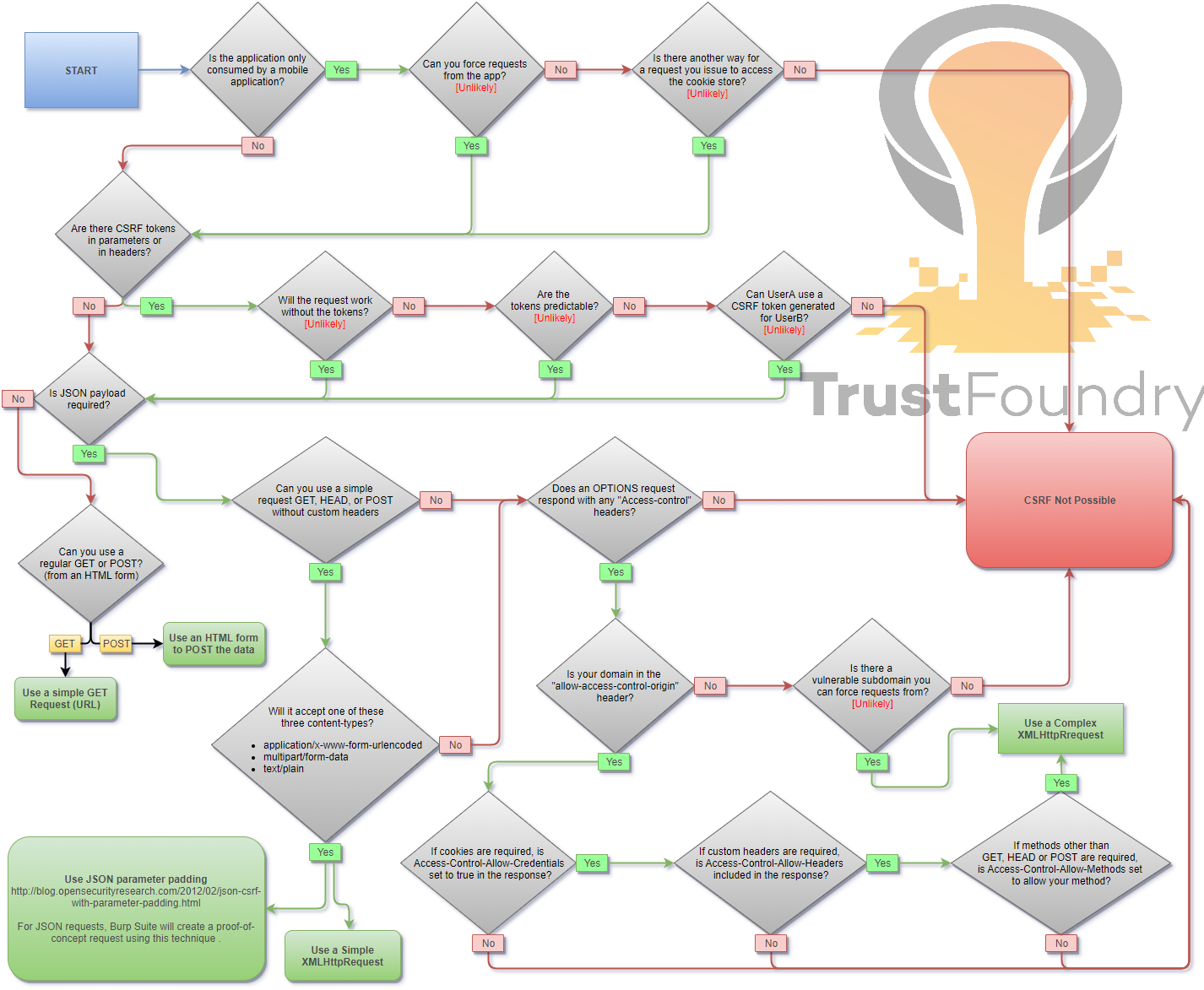# Cross-Site Request Forgery
> Cross-Site Request Forgery (CSRF/XSRF) is an attack that forces an end user to execute unwanted actions on a web application in which they're currently authenticated. CSRF attacks specifically target state-changing requests, not theft of data, since the attacker has no way to see the response to the forged request. - OWASP
## Summary
* [Tools](#tools)
* [Methodology](#methodology)
* [Payloads](#payloads)
* [HTML GET - Requiring User Interaction](#html-get---requiring-user-interaction)
* [HTML GET - No User Interaction)](#html-get---no-user-interaction)
* [HTML POST - Requiring User Interaction](#html-post---requiring-user-interaction)
* [HTML POST - AutoSubmit - No User Interaction](#html-post---autosubmit---no-user-interaction)
* [HTML POST - multipart/form-data with file upload - Requiring User Interaction](#html-post---multipartform-data-with-file-upload---requiring-user-interaction)
* [JSON GET - Simple Request](#json-get---simple-request)
* [JSON POST - Simple Request](#json-post---simple-request)
* [JSON POST - Complex Request](#json-post---complex-request)
* [Labs](#labs)
* [References](#references)
## Tools
* [XSRFProbe - The Prime Cross Site Request Forgery Audit and Exploitation Toolkit.](https://github.com/0xInfection/XSRFProbe)
## Methodology

## Payloads
When you are logged in to a certain site, you typically have a session. The identifier of that session is stored in a cookie in your browser, and is sent with every request to that site. Even if some other site triggers a request, the cookie is sent along with the request and the request is handled as if the logged in user performed it.
### HTML GET - Requiring User Interaction
```html
Click Me
```
### HTML GET - No User Interaction
```html
```
### HTML POST - Requiring User Interaction
```html
```
### HTML POST - AutoSubmit - No User Interaction
```html
```
### HTML POST - multipart/form-data with file upload - Requiring User Interaction
```html
```
### JSON GET - Simple Request
```html
```
### JSON POST - Simple Request
With XHR :
```html
```
With autosubmit send form, which bypasses certain browser protections such as the Standard option of [Enhanced Tracking Protection](https://support.mozilla.org/en-US/kb/enhanced-tracking-protection-firefox-desktop?as=u&utm_source=inproduct#w_standard-enhanced-tracking-protection) in Firefox browser :
```html
```
### JSON POST - Complex Request
```html
```
## Labs
* [PortSwigger - CSRF vulnerability with no defenses](https://portswigger.net/web-security/csrf/lab-no-defenses)
* [PortSwigger - CSRF where token validation depends on request method](https://portswigger.net/web-security/csrf/lab-token-validation-depends-on-request-method)
* [PortSwigger - CSRF where token validation depends on token being present](https://portswigger.net/web-security/csrf/lab-token-validation-depends-on-token-being-present)
* [PortSwigger - CSRF where token is not tied to user session](https://portswigger.net/web-security/csrf/lab-token-not-tied-to-user-session)
* [PortSwigger - CSRF where token is tied to non-session cookie](https://portswigger.net/web-security/csrf/lab-token-tied-to-non-session-cookie)
* [PortSwigger - CSRF where token is duplicated in cookie](https://portswigger.net/web-security/csrf/lab-token-duplicated-in-cookie)
* [PortSwigger - CSRF where Referer validation depends on header being present](https://portswigger.net/web-security/csrf/lab-referer-validation-depends-on-header-being-present)
* [PortSwigger - CSRF with broken Referer validation](https://portswigger.net/web-security/csrf/lab-referer-validation-broken)
## References
- [Cross-Site Request Forgery Cheat Sheet - Alex Lauerman - April 3rd, 2016](https://trustfoundry.net/cross-site-request-forgery-cheat-sheet/)
- [Cross-Site Request Forgery (CSRF) - OWASP - Apr 19, 2024](https://www.owasp.org/index.php/Cross-Site_Request_Forgery_(CSRF))
- [Messenger.com CSRF that show you the steps when you check for CSRF - Jack Whitton - July 26, 2015](https://whitton.io/articles/messenger-site-wide-csrf/)
- [Paypal bug bounty: Updating the Paypal.me profile picture without consent (CSRF attack) - Florian Courtial - 19 July 2016](https://web.archive.org/web/20170607102958/https://hethical.io/paypal-bug-bounty-updating-the-paypal-me-profile-picture-without-consent-csrf-attack/)
- [Hacking PayPal Accounts with one click (Patched) - Yasser Ali - 2014/10/09](https://web.archive.org/web/20141203184956/http://yasserali.com/hacking-paypal-accounts-with-one-click/)
- [Add tweet to collection CSRF - Vijay Kumar (indoappsec) - November 21, 2015](https://hackerone.com/reports/100820)
- [Facebookmarketingdevelopers.com: Proxies, CSRF Quandry and API Fun - phwd - October 16, 2015](http://philippeharewood.com/facebookmarketingdevelopers-com-proxies-csrf-quandry-and-api-fun/)
- [How I Hacked Your Beats Account? Apple Bug Bounty - @aaditya_purani - 2016/07/20](https://aadityapurani.com/2016/07/20/how-i-hacked-your-beats-account-apple-bug-bounty/)
- [FORM POST JSON: JSON CSRF on POST Heartbeats API - Eugene Yakovchuk - July 2, 2017](https://hackerone.com/reports/245346)
- [Hacking Facebook accounts using CSRF in Oculus-Facebook integration - Josip Franjkovic - January 15th, 2018](https://www.josipfranjkovic.com/blog/hacking-facebook-oculus-integration-csrf)
- [Cross Site Request Forgery (CSRF) - Sjoerd Langkemper - Jan 9, 2019](http://www.sjoerdlangkemper.nl/2019/01/09/csrf/)
- [Cross-Site Request Forgery Attack - PwnFunction - 5 Apr. 2019](https://www.youtube.com/watch?v=eWEgUcHPle0)
- [Wiping Out CSRF - Joe Rozner - Oct 17, 2017](https://medium.com/@jrozner/wiping-out-csrf-ded97ae7e83f)
- [Bypass Referer Check Logic for CSRF - hahwul - Oct 11, 2019](https://www.hahwul.com/2019/10/11/bypass-referer-check-logic-for-csrf/)